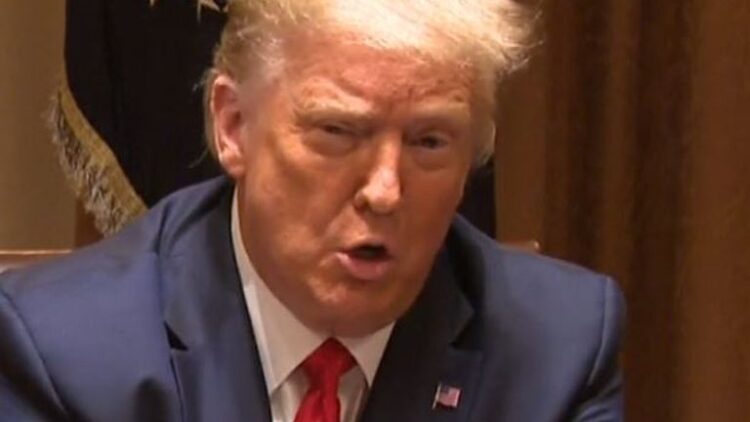By Aaron Miller-
The House select committee investigating the January 6 Capitol attack has accused former U.S president Donald Trump of violating multiple federal laws to overturn the 2020 election, including obstructing Congress and defrauding the United States.
The revelations came as part of a filing claiming that Donald Trump had began to lay the ground for alleging a fraud election even before the election begun.
The filing is also aimed at compelling John Eastman- the former U.S president’s lawyer- to turn over thousands of emails and records ever since he was implicated in potential crimes that counteracted arguments he had presented for attorney-client privilege protections.
The comprehensive letter by counsel Douglas detailed the Committee’s purpose and allegation in the 61-page filing stating its basis for concluding Trump violated the law by obstructing or attempting to obstruct an official proceeding and defrauded the United States by interfering with lawful government functions.
It mentions John Eastman as the plaintiff, who was also the president’s lawyer at the time who have a speech at a rally before the insurrection at the Capitol Hill. The Committee said it needed to understand all the plaintiff’s activities in order inform Congress’s legislative judgement and ensure that no president can ever obstruct the peaceful transfer of power again.
They said the plaintiff has pleaded the fifth amendment in response to 146 separate questions posed to him by the Select Committee and is attempting to conceal a range of documents behind claims of attorney client privilege and work product protection.
The plaintiff was also accused of ‘distributing important communication over an unprotected university server after being expressly admonished by the University president that he was not free to use university emails or computers in support of a political candidate’.
The Select Committee also made reference to the former president’s interest in secrecy of certain documents ordinarily protected by executive privilege, stating that those interests were outweighed by the Select Committee’s interests.
‘The former president knew he had not won enough electoral college votes to win the 2020 election, yet nevertheless sought then vice-president Mike Pence to manipulate the results in his favor’, the filing said in relation to Trump’s obstruction.
Had the effort to pressure Pence into returning Trump to power succeeded, the certification of Joe Biden’s win would have been impeded. “There is no genuine question that the president and plaintiff attempted to accomplish this specific illegal result,” the filing said.
The select committee said in the court submission that it believed Trump defrauded the United States by interfering in the certification process, disseminating false information about election fraud, and pressuring state officials to alter state election results.
Investigators also insisted it was evidence that the conspiracy to defraud extended to the Capitol attack, and that there was a compelling argument that Trump entered a conspiracy with the rioters to disrupt Biden’s certification on 6 January.
Letter also said in the filing that the select committee believed Trump and his associates appeared to have violated the law by engaging in common law fraud as they sought to overturn the results of the 2020 election.
The select committee’s findings came as part of a 16-part court submission to persuade a federal judge to force Eastman, a central figure in Trump’s scheme to return himself to office, to at least allow the panel to confidentially review his records.
Eastman helped lead a team of lawyers at a Trump “war room” at the Willard hotel in Washington DC, which Trump called from the White House the night before the Capitol attack to discuss ways to stop Biden’s certification from taking place, the Guardian has reported.
He has so far turned over about 8,000 pages of emails and documents from 4-7 January to the panel, but has withheld an additional 11,000 documents on the basis that they are protected by attorney-client privilege or constitute confidential attorney work product.
The panel also said in the filing that Eastman’s attorney-client privilege claims were undercut by his inability to show he had been formally retained as Trump’s lawyer. An “engagement letter” that Eastman produced last week was unsigned.
Through Letter’s submission, the select committee added Eastman could not claim to assert attorney-client privilege over emails he sent on his Chapman university email server, and those messages were not protected by the attorney work product protection.
House investigators said the evidence against Trump – and Eastman’s role in counselling Trump to engage in potentially criminal activity – amounting to
Eastman’s claims of attorney-client privilege were destroyed by the so-called “crime-fraud exception”, among other arguments.
“The attorney-client privilege does not shield participants in a crime from an investigation into a crime,” select committee member Jamie Raskin told the Guardian. “If it did, then all you would have to do to rob a bank is bring a lawyer with you and be asking for advice.”
The select committee said that in the first instance, it simply wanted to examine Eastman’s records “in camera” – a process that takes place when a reasonable person would agree a review of the materials may help establish whether the crime-fraud exception applies.




